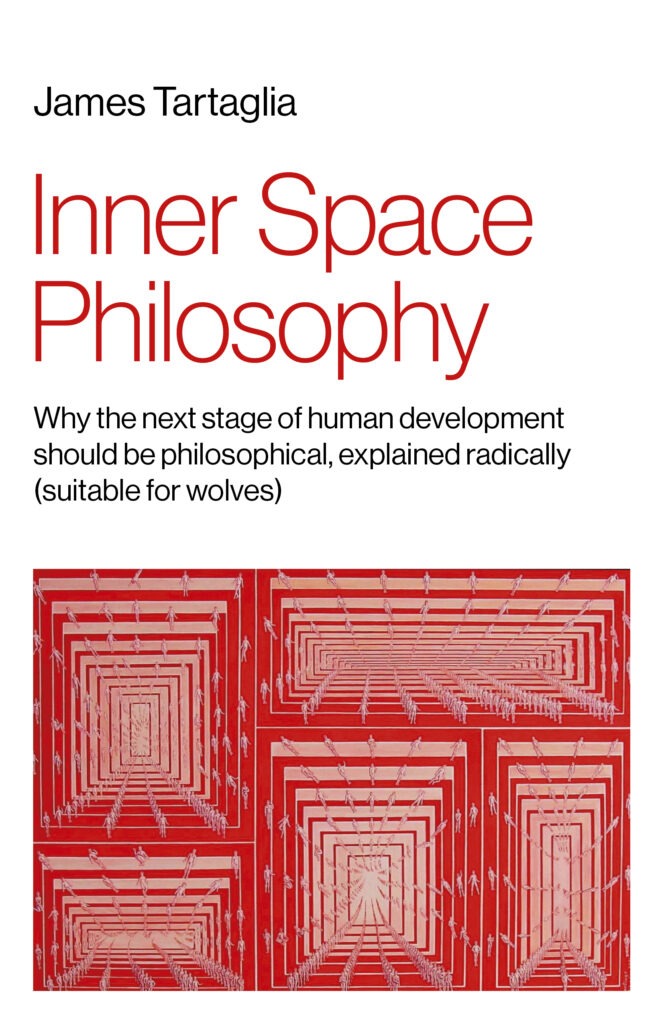The social pay-off of Idealism (The Return of Idealism)
Reading | Philosophy
![]() Prof. James Tartaglia, PhD | 2024-06-01
Prof. James Tartaglia, PhD | 2024-06-01

Prof. James Tartaglia advocates for a revival of metaphysical idealism, arguing that it is misunderstood and often unfairly dismissed by the scientific establishment. By clarifying common misconceptions, Tartaglia reveals how idealism could offer significant social benefits, encouraging a more philosophical society focused on the primacy of experience. His new book, Inner Space Philosophy: Why the Next Stage of Human Development Should Be Philosophical, Explained Radically (Suitable for Wolves), comes out on the 28th June 2024. This essay is the latest instalment of our The Return of Idealism series, produced in collaboration with the Institute of Art and Ideas (IAI). It was first published by the IAI on 29 May 2024.
These days, metaphysical idealism is an immediate turn-off for most secular, scientifically minded people, who start to think of gods and spirits, maybe even Ouija boards. I think that’s a shame, because it’s a prejudice that results from some straightforward misunderstandings—misunderstandings which have greatly benefited the fortunes of idealism’s ancient metaphysical rival, materialism. To understand the potential social benefits of idealism you need to be able to take the view seriously, so let’s start by clearing away some of those misunderstandings.
Firstly, idealism has no commitment to gods or spirits, only to the existential primacy of conscious experience—or, at least, that’s the kind of idealism I’m talking about, there are others. The 19th century German philosopher Arthur Schopenhauer was no less ardent in his commitment to atheism than to idealism. I’m not denying that if you’re a believer then you’re better off with idealism than materialism—a physical God is a weird idea—but my point is simply that the two don’t necessarily need to go together. I think the idealist interpretation of reality is the best we’ve got, and I have no religious beliefs and do not believe in anything supernatural; never have, and unless something very unexpected happens, never will.
Secondly, materialism is not science, it’s not even close—materialism provides a metaphysical interpretation of what science tells us about the world, just as idealism does. Materialism originated in the 5th century B.C. in Greece and India, back in the days when you were allowed to define your own “atoms,” the materialist’s building blocks of reality. Materialism and idealism are competing metaphysical interpretations of our reality, as are dualism, panpsychism and all the other more esoteric options. Maybe you’re suspicious of metaphysical theorizing in general (in which case I think that on closer examination you’d find your suspicions were ungrounded)—but in that case you should be just as suspicious of materialism as of idealism.
Thirdly, idealism is not saying that solid things, like rocks and pebbles, are wispy and immaterial things, akin to clouds or puffs of smoke. For a start, that comparison doesn’t even make sense, since clouds and puffs of smoke exist in space, and according to idealists, experience doesn’t. And if idealism really were saying that rocks and pebbles are clouds of immaterial stuff, then it would be making a scientific hypothesis, one which would need to be empirically tested. Idealism simply isn’t in that kind of business.
Okay then, so what is idealism saying about rocks and pebbles? It’s saying we are part of a universe of pure conscious experience, and that believing in the physical existence of rocks and pebbles allows humans to get their bearings in that ocean of sentience. Rocks and pebbles are a way of making sense of experience, they are posits within an explanatory model—the experience exists, it’s independently there, and we understand it by thinking of it as experiences of things like rocks and pebbles. Rocks and pebbles don’t independently exist, but the nature of experience is such that they seem to—that’s why the explanatory model works, that’s why we came up with a specifically physical model. The materialists instead say that the rocks and pebbles independently exist, but then they have a problem with what to say about experience, a problem they’ll never solve, in my view—instead they’ll endlessly oscillate between the two nonsensical options of saying it doesn’t exist or that it mysteriously arises from the brain. But that’s another matter—if you want to know what convinces me of idealism you can look at my book, Philosophy in a Technological World: GODS AND TITANS (the warring gods and titans of the story I tell in that book are idealism and materialism, by the way). What I want to concentrate on here are some possible benefits of a societal turn to idealism.
The main benefit I’m going to talk about, one which might have all kinds of knock-on effects, is that idealism tells us we live in a reality consisting of all we ever really cared about: experience. What do I mean by saying that experience is all we care about? And why would believing that have societal benefits? To start with the first question, consider the following. Three things that people might very seriously care about are: owning a new Italian sportscar, becoming a famous YouTuber, and not getting seriously ill. But suppose you knew that the moment you first climbed into your shiny new Lamborghini Huracá (yellow), you would fall into the most terrible depression ever, one that would last for as long as you owned the car—you wouldn’t want it then, because all you ever really wanted was the experiences associated with owning it, elation, pride, excitement, that kind of thing, none of which is available when you are seriously depressed. The same applies to becoming a famous YouTuber—if it made you feel awful then you’d regret it immediately. And in the case of getting seriously ill it’s even more obvious—you don’t want the pain, you don’t want the fear, and you certainly don’t want your experiences to be brought to an end by death. Experience, I maintain, is all we really care about: love, contentment, excitement, interest, satisfaction, tingles, all that kind of business. And there is nothing remotely selfish about that either, since we can care about each other’s feelings, love would be impossible otherwise.
Our attraction to experience makes perfect sense, according to idealism, because we’re experiential beings. But even if that’s true, why does it matter? Why would being more in touch with the metaphysically ultimate nature of reality benefit us practically? Well, the way I see it is that if the idealist view is indeed correct, but you don’t believe it, perhaps because you’re a materialist, then you’ll end up with a strange mismatch between what you say you believe and what you act as if you believe. You’ll be someone who spends their life in pursuit of experiences even though experience has little or no place in their conception of reality. Ask most people about their conception of reality and their thoughts quickly turn to outer space or infinitesimally small particles—experience completely drops out of the picture. But then, after they stop thinking about “reality” and return to their everyday lives, experience once again becomes their main focus.
I don’t think letting our officially sanctioned conception of reality become so completely out of kilter with our lives is a good idea. To be fair, it may be unavoidable, because materialism might be true even though science cannot explain experience at present—but I don’t think this is the case. But either way, the societal effect of this mismatch is that general, philosophical reflection on the nature of the reality you’ve found yourself born into has been seriously disincentivised. Reality has become something for experts to concern themselves with, something interesting to hear about on science podcasts, perhaps, but remote from your everyday concerns with experience. So, people become less inclined to actively, creatively and critically reflect on their existential situation, that is, they become less philosophical.
Now, suppose that while people were becoming less philosophical, their technological capabilities were rapidly developing, and that this development wasn’t directed by a philosophical vision of a desirable human future, but rather by the ingenuity of scientists and technologists making whatever new, previously unmakeable things they could. Is that not essentially the situation we find ourselves in? I think it is, and yet look where our technology is heading, however unintentionally—to experience! Our technological development, driven by the market, is chasing after experience, just as we chase after it in our everyday lives.
We have very rapidly gone from the passive experience of television to the active control over non-natural experience provided by video games; and now virtual reality is developing fast, when they get that right how are we ever going to stay outside of it for long? As these “experience machines” have become better and better, they have taken up more and more of our lives; as far as our younger generations are concerned they seem to be completely taking over. And now we are trying to make autonomous experience machines too, artificial intelligences, because whether through the fog of materialism or just lack of reflection, they seem like created minds—and to be able to create minds suggests godlike control over experience.
These directions of technological travel—natural to us, an idealist would say, but not reflective of any wisdom—have not been decided through philosophical reflection on how we want human life to develop. That is not how it happens at all. What happens is that scientists and technologists compete to make breakthroughs, then the breakthroughs get commercialized and people buy into the new tech—society then benefits from the upsides while trying to deal with the downsides, until the next big tech development comes along.
But think what might happen if idealism starts to catch on. For more and more people, what they care most about is what they consider to be most real. A population like that, of the kind that has not yet existed, would be a lot more philosophical. Imagine yourself believing that idealism is true—if this were a genuine new belief for you, then the world you thought you were familiar with would suddenly seem very odd indeed, you’d think about it a lot! After all, you’ve just realised you’re swimming in that ocean of sentience I spoke of earlier. While you’re trying to get to grips with the enormity of it all, your thoughts will likely spin off in all kinds of new philosophical directions.
As our population becomes increasingly philosophical, thanks to idealism, people could be expected to take much more interest in technological development and how it is being used to shape the human future. They might start taking a view on how technological development ought to be happening, views which might feed into democratic politics. Then, the next thing you know, the human race is coordinating their technological development, which has become firmly focused on refining and improving our experiences, so that there’s more love, beauty, ecstasy, and cleverness around, but less hate, ugliness, boredom and stupidness. Since we now think we’re experiential beings, identities such as gender and race seem less important, at the ultimate level we know we’re all alike and we find cooperation easier. When we first make contact with extraterrestrials, they remark that humans are a remarkably philosophical species. They’re impressed by the kind of experiences we have and emulate us. Our good influence starts to spread around the galaxy.

Essentia Foundation communicates, in an accessible but rigorous manner, the latest results in science and philosophy that point to the mental nature of reality. We are committed to strict, academic-level curation of the material we publish.
Recently published
Reading
Essays
Seeing
Videos
Let us build the future of our culture together
Essentia Foundation is a registered non-profit committed to making its content as accessible as possible. Therefore, we depend on contributions from people like you to continue to do our work. There are many ways to contribute.
















